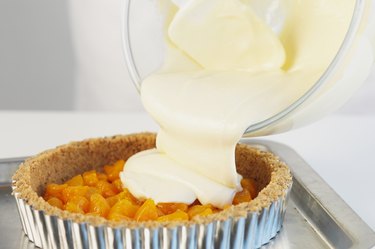
If you've ever read the back of a cake mix package, you might be wondering why cook times are different depending on whether you use a glass or metal pan. The science has to do with how a pan heats up, holds its temperature and distributes heat. Glass tends to cook faster than metal, and knowing why that is, and what effect it has on your food, will help you choose the right pan for whatever you're whipping up in your kitchen.
Glass Is Faster
Video of the Day
Glass pans tend to cook food faster than most metal pans. When you use a glass pan, the glass heats up gradually, but once it's hot, it tends to hold its temperature more steadily, according to the U.S. Department of Energy. This matters because when you're baking something, your oven goes through heating and cooling cycles. As your oven goes through a cooling cycle, a glass pan is better able to maintain its temperature. In turn, the foods you're cooking absorb the heat faster, and cook more quickly, according to the University of Nebraska Cooperative Extension.
Video of the Day
Metal Is Slower
The temperature of some metal pans fluctuate more as the food cooks, and that can extend the cooking time. Metal pans begin to cook a food more quickly, according to the U.S. Department of Energy, but because metal also heats and cools more noticeably, it can extend the cooking time regardless.
Dark or Light Metal?
The color of a metal pan makes a big difference. If you use a dark metal pan, you can expect cooking times more similar to what you'd see if you used a glass pan, reports the University of Nebraska Cooperative Extension. The sheen of a metal pan influences cook time, too. A dull metal pan, or a glass pan, can cook a food up to 20 percent faster than a shiny pan, writes Harold McGee, author of "On Food and Cooking: The Science and Lore of the Kitchen."
Making Your Choice
That glass and certain types of metal cook faster than other types of metal matters when it comes to what kinds of food you're cooking. For example, glass pans are usually better for pies and breads, while shiny metal pans are better for cookies and cakes, notes the University of Nebraska Cooperative Extension. Foods without crust, such as soufflé, cook better in glass pans, suggests the U.S. Department of Energy.
- U.S. Department of Energy Office of Science: Bakeware Materials Differences
- University of Nebraska Cooperative Extension: Should You Use Dark Metal, Shiny Lighter-Colored Metal or Glass Bakeware?
- On Food and Cooking: The Science and Lore of the Kitchen; Harold McGee
- Cookware Manufacturers Association: Guide to Cookware and Bakeware